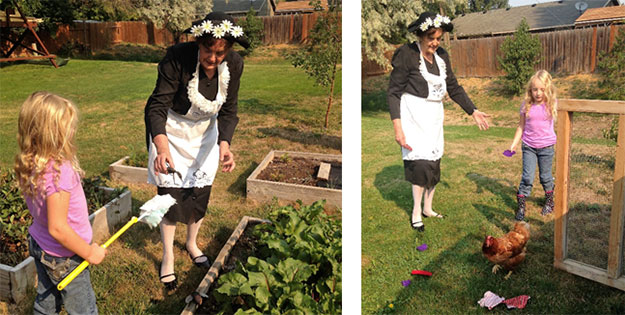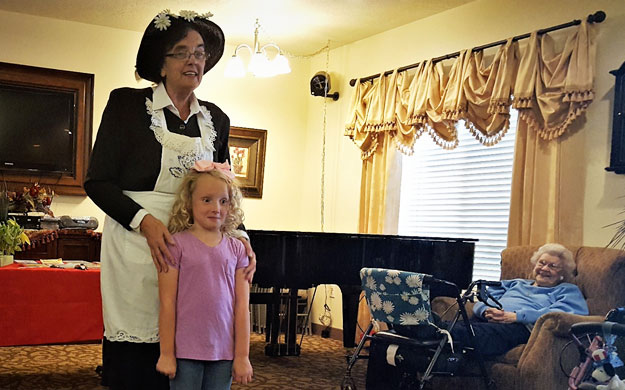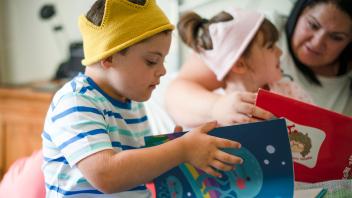
Acting stories out is a brilliant way to get to the heart of what children are reading. And not only does story dramatization have positive effects on language development and student achievement, it is an absolute blast. Wren and her Namma, Jan Worthington, take us behind the scenes of their recent page to stage adventure.
Dr. Janet Worthington is a retired dean and professor who now has more free time for her Women of History portrayals of historical figures and playing dress up with her grandchildren.
Amelia Bedelia has delighted children and adults with her misunderstandings of the idioms and oddities in the English language since 1963. When reading Peggy Parish’s and Herman Parish’s books with granddaughter Wren, she immediately picked up on Amelia Bedelia’s literal interpretations. Wren also picked up on the slapstick humor of Amelia Bedelia’s antics. So, when we were planning an activity to bring some laughter and joy to residents at local retirement homes, we decided Amelia Bedelia fit the bill.
From years of experience presenting living literature and living history to students, I know that children are more engaged and involved in a story when they participate in it. Story dramatization can boost comprehension, vocabulary, and language development. Children grow as listeners, speakers, readers, and writers when they explore characters, enact plots, and reflect on their dramatic interpretations. Wren is growing as a reader and this seemed to be both a powerful and purposeful opportunity for her to focus on learning new words and building comprehension skills.
Our first step toward our story dramatization was to read as many Amelia Bedelia books as we could and find our roles. Wren had her own criteria for characters: “The characters had to be someone who could look like me, but no matter what, Namma is always ‘Amelia Bedelia.’” Consequently, we selected tales such as Amelia Bedelia and the Baby , Amelia Bedelia Helps Out (featuring niece Effie Lou), and Amelia Bedelia Goes Back to School and practiced telling these stories to each other, working out our dialogue.
Imagination was paramount in the search for props, and the Dollar Store a critical source of materials, such as the plastic leaves on bunches of flowers that “weeded” the garden when Amelia Bedelia and Effie Lou helped out. Trying out some of Amelia Bedelia’s misunderstandings in very real settings — such as dusting the bugs in the garden — was truly a highlight of our performance planning. And chickens do, in fact, react to all sorts of offerings — pecking at “scraps” (of cloth) that have been thrown out for their dinner!

Costumes were a simpler step as black dresses, aprons and flowers for hats were easy to come by. In bringing Amelia Bedelia and the Baby to life, Wren, as the baby, was dressed in a large footed sleeper. These heavy pajamas did cause Wren to experience serious discomfort, as her crying and kicking made for very hot work and a tired and overheated small actress. The biggest sacrifice was for the Effie Lou role, however. Her glorious, long golden ringlets required a night in sponge rollers, resulting in no sleep at all, according to Wren.
But the result was an afternoon of smiles for seniors.

And the reading, learning, and life experiences from our exciting adventure were many, including:
- a purposeful exploration of a series of books
- practice in understanding and coping with the idioms and idiosyncrasies of the English language
- applications of measuring real life experience to experiences with literature
- building skills in shifting the printed words to the spoken words and actions
- inventing props and costumes by seeing similarities in apparently dissimilar objects
- cross generational interaction that leads to appreciation and understanding.
So, to Peggy Parrish, Herman Parish, and Amelia Bedelia, Wren and I say, “Thanks to you, we brought down the house!” But fortunately, not literally.
About the Author
Join children’s literacy consultant Rachael Walker and many of the authors, parents, and educators she’s met and worked with to talk about how books have changed their lives, how to bring books to life for young readers, and how to enrich kids’ lives with good books.

